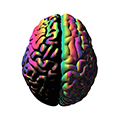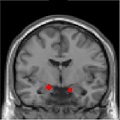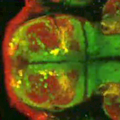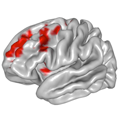Science Updates About Post-Traumatic Stress Disorder (PTSD)
- Collaborative Care Could Help Reduce Disparities in Mental Health Treatment
-
In an NIMH-funded study, a comprehensive collaborative care intervention significantly reduced post-traumatic stress disorder (PTSD) symptoms among trauma patients from racial and ethnic minority backgrounds.
- Scientists Map Networks Regulating Gene Function in the Human Brain
-
An NIMH-funded research consortium has produced the largest and most advanced multidimensional maps of gene regulation networks in the brains of people with and without mental disorders.
- Feelings of Detachment After Trauma May Signal Worse Mental Health Outcomes
-
A new NIMH-supported study shows that experiencing persistent feelings of detachment following trauma is an early psychological and biological marker of worse mental health outcomes.
- Brain Activity Patterns After Trauma May Predict Long-Term Mental Health
-
The way a person’s brain responds to stress following a traumatic event, such as a car accident, may help to predict their long-term mental health outcomes, according to NIMH-supported research.
- Puerto Rico’s “Fear Lab” Mentors Neuroscience Rigor amid Diversity
-
A lineage of young neuroscientists from diverse backgrounds trace their scientific roots to a “fear lab” in Puerto Rico that the National Institutes of Health has been supporting for two decades.
- Brain Biomarkers Could Help Identify Those at Risk of Severe PTSD
-
This study has shed light on the neurocomputational contributions to the development of post-traumatic stress disorder in combat veterans, finding distinct patterns for how the brain and body respond to learning danger and safety depending on the severity of PTSD symptoms.
- A Shorter—but Effective—Treatment for PTSD
-
Research supported by the National Institute of Mental Health has shown that a shorter therapy (written exposure therapy) may be just as effective as lengthier first-line treatments for PTSD.
- Brain’s Alertness Circuitry Conserved Through Evolution
-
Using a molecular method likely to become widely adopted by the field, researchers have discovered brain circuitry essential for alertness – and for brain states more generally.
- Imaging Pinpoints Brain Circuits Changed by PTSD Therapy
-
Using brain imaging to track the effects of treatment of post-traumatic stress disorder (PTSD), scientists have identified a brain circuit on which a frequently used and effective psychotherapy (prolonged exposure) acts to quell symptoms. The findings help explain why the neural circuit identified is a promising target for additional treatment development, including brain stimulation therapies.
- NIMH-Funded Study to Track the Effects of Trauma
-
By carefully tracking 5,000 people after they have experienced a traumatic event, a just-launched NIMH-funded study aims to provide a finely detailed map of the array of factors that play a role in the development of mental disorders that occur in the wake of trauma.










